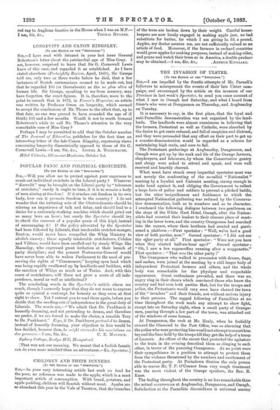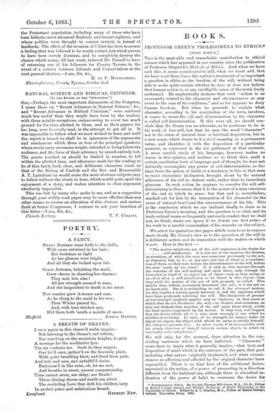THE INVASION OF ULSTER. [To THE EDITOR OF THE "SPECTATOR."]
SIR,—I am impelled by the frantic attempts of Mr. Parnell's- followers to misrepresent the events of their lateUlster cam- paign, and encouraged by the article on the invasion of our Province in last week's Spectator, to send you some account of what I saw in Omagh last Saturday, and what I beard from friends who were at Dungannon on Thursday, and Aughnacloy on Tuesday.
It is necessary to say, in the first place, that the loyal an& anti-Parnellite demonstration was not organised by the land- lords. The landlords were almost unanimous in believing that the farmers, Protestant as well as Catholic, were absorbed by the desire to get rents reduced, and full of suspicion and distrust,. and they were persuaded that any effort on their part to get up a counter-demonstration would be regarded as a scheme for- maintaining high rents, and sure to fail.
The Protestant gatherings at Aughnacloy, Dungannon, and Omagh were got up by the rank and file of the Orange farmers,. shopkeepers, and labourers, by whom the Conservative gentry and clergy were asked to attend and speak, and were well received and heartily cheered.
What must have struck every impartial spectator most was not merely the confronting of the so-called " Nationalist ' meeting by a loyalist and Unionist meeting, strong enough to. make head against it, and obliging the Government to collect a large force of police and soldiers to prevent a pitched battle,. but the utter insignificance and feebleness to which the attempted Nationalist gathering was reduced by the Conserva- tive demonstration, both as to numbers and as to character._ I overheard the following dialogue between two gentlemen on the steps of the White Hart Hotel, Omagh, after the Nation- alists had escorted their leaders to their obscure place of meet- ing in the lower town, and the country Orangemen had marched into the square, where their brethren had erected and garri- soned a platform :—First spectator : "Well, we've had a good view of both parties, now." Second spectator : "I did not see- the other party at all." First spectator: "Were not you here when they started half-an-hour ago F" Second spectator "Oh, I saw a few ragamuffins running after a waggonette.' First spectator : "That was the other party !"
The Orangemen who walked in procession with drums, flags,.
and sashes, were joined at the meeting by a still larger body of independent Protestant farmers and others, and the whole body was remarkable for fine physique and respectable appearance. Great enthusiasm prevailed, and there was an. angry ring in their cheers which convinced those who know the country and had seen both parties that, but for the troops and police, the Protestants would very soon have cleared the town of the " invaders " and their friends, not without serious injury to their persons. The ragged following of Parnellites at no, time throughout the week made any attempt to show fight,. except late on Saturday night, when a small party of Orange- men, passing through a low part of the town, was attacked out of the windows of some houses.
At Dungannon, the rush at Mr. Healy, when he foolishly
crossed the Diamond to the Post Office, was so alarming that the police who were protecting him would notattempt to escort him beyond the lines held by the troops till they got the help of a troop. of Lancers. An officer of the escort that protected the agitators to the train in the evening described them as clinging to each other, in terror of the pursuing Orangemen. At no point were their sympathisers in a position to attempt to protect them from the violence threatened by the numbers and excitement of the Protestant party. At Portadown Station the only person able to rescue Mr. T. P. O'Connor from very rough treatment was the most violent of the Orange speakers, the Rev. R. Kane.
The feeling throughout the country is no less remarkable than the actual occurrences at Aughnacloy, Dungannon, and Omagh.. Satisfaction at the Parnellite discomfiture is universal among
the Protestant population, including many of those who have been hitherto most advanced Radicals and tenant-righters, and whose politics were thought to consist entirely in hatred of landlords. The effect of the invasion of Ulster has been to arouse a feeling that was believed to be nearly extinct, but which proves to have been merely dormant, and to completely destroy the chance which many, till last week, believed Mr. Parnell to have of returning one of his followers for County Tyrone, in the -event of a contest between Liberals and Conservatives at the next general election.—Iam, Sir, &c.,



































 Previous page
Previous page